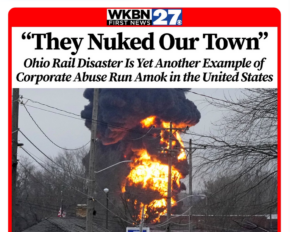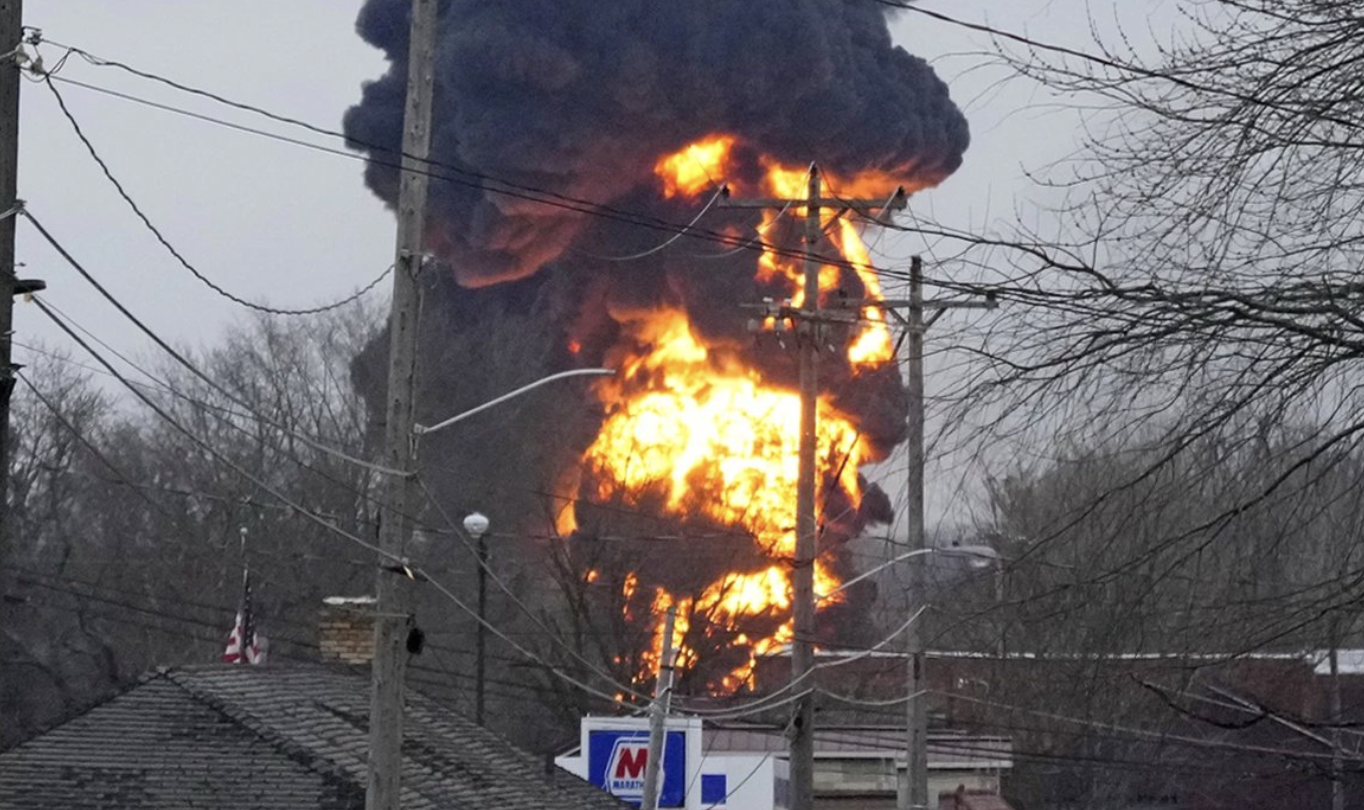 For years communities and railroad unions on the frontline of America’s creaking railroad network have warned of a “ticking time bomb” on the railways.
For years communities and railroad unions on the frontline of America’s creaking railroad network have warned of a “ticking time bomb” on the railways.
They have repeatedly called for safety improvements after derailment after derailment of toxic chemicals and crude oil. Their voices have been silenced in the pursuit of profit as costs are cut and regulations ripped up.
It is now two weeks since the apocalyptic scenes in East Palestine when a train carrying highly hazardous chemicals derailed in rural Ohio on the border with Pennsylvania. Upon derailing, the 50-car train in Ohio burst into 100-foot flames, resulting in a catastrophic environmental disaster.
The train was being operated by Norfolk Southern, a company now under the spotlight for lobbying to reduce safety regulations and putting firefighters and the community at risk in the hours and days since the disaster.
Two weeks on, the New York Times reports that “concerns about the disaster’s effects on human health and the environment are growing, and experts warned that understanding the causes and consequences could require a more comprehensive investigation than what they have seen so far.”
At the heart of concerns are the toxic chemicals the freight was carrying. OCI has repeatedly voiced concerns about the dangers of crude oil trains; this time, the train was carrying highly toxic chemicals linked to the plastics industry, a by-product of oil.
Five rail cars contained nearly one million pounds of vinyl chloride, a gas linked to various cancers, which is used to make PVC, which is also highly flammable. The gas is transformed into liquid form, so when the train derailed, it was literally spewing boiling gas. When it burns, vinyl chloride turns into hydrogen chloride, which, when mixed with water, turns into hydrochloric acid.
Other chemicals on board were ethylene glycol monobutyl ether, ethylhexyl acrylate, and isobutylene. Ethylhexyl acrylate is also a carcinogen and causes breathing difficulties. Isobutylene causes dizziness and drowsiness.
With that toxic soup on board, officials had a choice: let the whole train potentially ignite or undertake a controlled explosion. They did the latter, resulting in what residents likened to a mushroom cloud visible for miles and from space. Some 1,500 residents were forced to evacuate.
14 miles from my house, in East Palestine Ohio.
Norfolk Southern assures us that the vinyl chloride spilling from the tanks of their derailed train and burning and turning into hydrogen chloride as it rises into the atmosphere and mixes with water vapor and turns into …… pic.twitter.com/Rc8wbpXU8R
— ?????? ? ???????? ?? ???? (@blckndgldfn) February 8, 2023
The disaster led the Ohio Governor, Mike DeWine, to tell residents, “you need to leave. You just need to leave. We’re ordering you to leave. This is a matter of life and death.”
But the company and authorities’ response has led to deep criticism: “We basically nuked a town with chemicals so we could get a railroad open,” said Sil Caggiano, a hazardous materials specialist told local media. The long-term health impacts of exposure to these chemicals for the local community and workers are unknown, especially the synergetic effect of the different chemicals.
Residents feared for their lives. Since the release of chemicals, health concerns have been mounting in the local community, with Grist reporting that “Residents have reported headaches, dizziness, and fevers since returning home,” and residents “reporting deaths of pets, chickens, and foxes.”
There is also concern about the spill’s proximity to the Ohio River after chemicals spilt from the train into the river. Already officials have found thousands of dead fish. The wide river basin is home to some 25 million people. Others were concerned that local drinking water is at risk, too, with authorities urging people to drink bottled water.
Every day brings news of another scandal and outrage about how and why this disaster was allowed to happen. Despite its highly toxic cargo, the train was labelled non-hazardous, so local officials were not informed that it was crossing the state.
? BREAKING: Train cars that derailed in Ohio were labeled non-hazardous pic.twitter.com/UEySzSHFGK
— Sophia Kianni (@SophiaKianni) February 15, 2023
Two days ago, Governor Josh Shapiro, the governor of Pennsylvania, wrote to the railroad company Norfolk Southern to express serious concerns regarding the company’s management of the train derailment. This included not informing the local authorities of the disaster and of giving inaccurate information and putting first responders and the communities “at significant risk.”
However, other deeply worrying issues have emerged which have enormous ramifications for railway workers, communities and the wider environment. The East Palestine disaster is the epitome of how broken America’s railroads have become, their safety shattered by the deregulation years of the toxic Trump administration.
The Lever has reported that Norfolk Southern helped kill a federal safety rule aimed at upgrading the rail industry’s Civil War-era braking systems. Unbelievably, the vast majority of the nation’s trains continue to rely on a braking system first developed way back in 1868.
The Lever reports, “Amid the lobbying blitz against stronger transportation safety regulations, Norfolk Southern paid executives millions and spent billions on stock buybacks — all while the company shed thousands of employees despite warnings that understaffing is intensifying safety risks.”
The company also “fought off a shareholder initiative that could have required company executives to ‘assess, review, and mitigate risks of hazardous material transportation.’”
And now the community are demanding justice and answers. Already several lawsuits have been filed accusing Norfolk Suffolk of negligence. There are calls for independent testing of residents:
They absolutely must have independent testing going on in #EastPalestineOhio.
It's the only way the people in the town and in the immediate area are going to feel safe.
There is the environmental crisis but also the human one and these people need the support.
— Erin Brockovich (@ErinBrockovich) February 15, 2023
One local organization, River Valley Organizing, has set up a petition to Ohio and Pennsylvania Governors demanding they provide medical monitoring, independent environmental testing, and regular meetings with impacted community members. River Valley Organizing also stated that in 2014, “we warned the federal government/EPA with thousands of signatures that a disaster like this could happen.”
The group is asking, “Now we are asking for your support to push Ohio Governor Mike DeWine “to declare a federal emergency, pushing Biden to honor the declaration and send FEMA aid. Let’s keep politics out of this and think about the safety of our families. We need your help today.”
As the communities call for help, the lesson from the disaster is to listen to the unions and frontline communities who have been warning about a disaster like this for years. We need to put workers and communities above raw profit and greed. Before another railroad train explodes.

